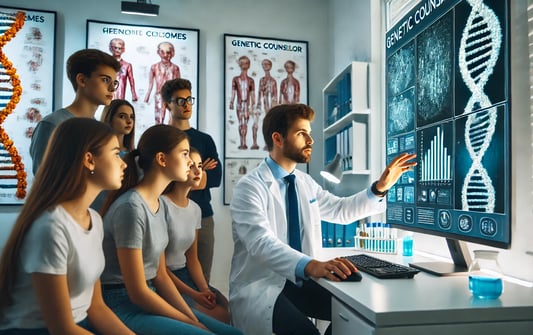The Best Major for Genetic Counseling?
Discover the best major for genetic counseling and how it prepares you for a successful career in this field.
CAREER ADVICECAREER INFORMATION


What is the Best Major for Genetic Counseling?
Genetic counseling is a unique and rewarding field that combines science, healthcare, and interpersonal skills. As genetic knowledge expands, the demand for genetic counselors continues to grow. Choosing the right major is a crucial first step toward a successful career in genetic counseling, providing the foundational knowledge and skills needed for advanced studies and professional practice.
Understanding the Role of a Genetic Counselor
Genetic counselors play a vital role in healthcare, offering guidance and support to individuals and families dealing with genetic conditions. They interpret genetic test results, provide risk assessments, and help patients make informed decisions about their health. Essential qualities for genetic counselors include strong communication skills, empathy, critical thinking, and a solid understanding of genetics.
Educational Pathways to Genetic Counseling
To become a genetic counselor, you typically need a master's degree in genetic counseling from an accredited program. This advanced degree provides specialized training in genetics, patient care, and counseling techniques. However, your undergraduate major lays the groundwork for this advanced study, making it essential to choose a major that aligns with the prerequisites of genetic counseling graduate programs.


Best Undergraduate Majors for Genetic Counseling
Several undergraduate majors can effectively prepare you for a career in genetic counseling. Here are some of the best options:
Biology
A major in biology offers a comprehensive understanding of living organisms, which is fundamental for genetic counseling. Courses in molecular biology, genetics, and cell biology provide essential knowledge for understanding genetic conditions and their impact on health.
Genetics
A specialized major in genetics focuses on the principles of heredity and genetic variation. This major delves deeply into the mechanisms of genetic disorders, preparing you with the detailed knowledge required for genetic counseling.
Psychology
Psychology is another excellent major for aspiring genetic counselors. This field studies human behavior and mental processes, equipping you with the skills to support patients emotionally and psychologically. Courses in counseling, abnormal psychology, and developmental psychology are particularly beneficial.
Social Work
Social work majors learn about supporting individuals and families in various contexts, which is highly relevant to genetic counseling. This major emphasizes communication, advocacy, and ethical decision-making, all crucial skills for genetic counselors.
Public Health
A public health major focuses on improving community health and preventing disease, offering a broader perspective on healthcare. This major covers epidemiology, health policy, and community health, providing a solid foundation for understanding the public health implications of genetic counseling.






Additional Recommended Coursework
Regardless of your major, certain courses are highly recommended to prepare for genetic counseling graduate programs:
Essential Courses
Genetics
Molecular Biology
Biochemistry
Psychology
Statistics
Elective Courses
Medical Ethics
Human Development
Sociology
Health Communication


Importance of Related Experience
In addition to coursework, gaining relevant experience is crucial for aspiring genetic counselors. This experience can come from internships, volunteering, or research opportunities. Working in healthcare settings, shadowing genetic counselors, and participating in genetics research projects can provide valuable insights and strengthen your graduate school application.
Applying to Genetic Counseling Graduate Programs
When applying to genetic counseling graduate programs, it's important to meet the admission requirements and present a competitive application. This typically includes:
A strong academic record in relevant coursework
Letters of recommendation
Relevant experience in healthcare or research
A well-written personal statement
An understanding of the field demonstrated through shadowing or informational interviews




Choosing the best major for genetic counseling involves considering your interests and the prerequisites of genetic counseling graduate programs. Majors such as biology, genetics, psychology, social work, and public health provide a solid foundation for advanced studies in this field. Complementing your major with relevant coursework and gaining practical experience will further prepare you for a successful career as a genetic counselor. With the right educational background and experiences, you can make a meaningful impact in the lives of individuals and families facing genetic health challenges.


